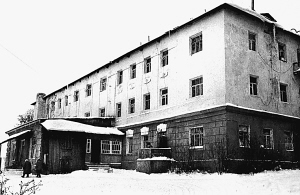More languages
More actions

The 6th National Congress of the Communist Party of China (中国共产党第六次全国代表大会) was held in the "Silver Villa" in the town of Zvinigorod, a suburb of Moscow from June 18 to July 11, 1928. A total of 142 representatives attended the meeting, including 84 official representatives with voting rights.[1]
Reports[edit | edit source]
On behalf of the Fifth Central Committee, Qu Qiubai made a political report on "The Chinese Revolution and the Communist Party", Zhou Enlai made an organizational report and a military report, Li Lisan made a report on peasant issues, Xiang Zhong made a report on the workers' movement, and Bukharin, a representative of the Communist International, made a report on " The Chinese Revolution and the Tasks of the Communist Party of China".[1]
Measures Passed[edit | edit source]
The Congress passed resolutions on issues such as politics, military affairs, organization, Soviet power, peasants, land, workers, propaganda, nationalities, women, and the Youth League, as well as the revised "Party Constitution of the Communist Party of China."[1]
Election Results[edit | edit source]
The Sixth Congress elected a new Central Committee: 23 Central Committee members and 13 alternate Central Committee members. The subsequent First Plenary Session of the Sixth Central Committee elected Su Zhaozheng, Xiang Ying, Zhou Enlai, Xiang Zhongfa, Qu Qiubai, Cai Hesen, and Zhang Guotao as members of the Political Bureau of the Central Committee, and Guan Xiangying, Li Lisan, Luo Dengxian, Peng Pai, Yang Yin, Lu Futan, and Xu Xigen as members of the Political Bureau Alternate members: Su Zhaozheng, Xiang Zhongfa, Xiang Ying, Zhou Enlai, and Cai Hesen were elected as members of the Standing Committee of the Political Bureau of the Central Committee, and Li Lisan, Yang Yin, and Xu Xigen were elected as alternate members of the Standing Committee. The first meeting of the Political Bureau of the Sixth Central Committee elected Xiang Zhongfa as Chairman of the Political Bureau of the Central Committee and Chairman of the Standing Committee of the Political Bureau of the Central Committee, and Zhou Enlai as Secretary General of the Standing Committee of the Political Bureau of the Central Committee.[1]
Outcome[edit | edit source]
The Sixth National Congress of the Communist Party of China is a meeting of great historical significance held in a specific historical period and under historical conditions. The Sixth National Congress conscientiously summed up the experience and lessons since the failure of the revolution, and gave basically correct answers to a series of fundamental questions about the Chinese revolution that were seriously debated. It concentrated on solving the two major problems that troubled the party at that time: First, on the nature of China's society and the nature of revolution, it pointed out that China at the current stage was still a semi-colonial and semi-feudal society, and none of the basic contradictions that caused the Chinese revolution had been resolved. The Chinese revolution is still a bourgeois democratic revolution. Second, regarding the revolutionary situation and the Party's tasks, it was clarified that the revolution was at a low ebb, that the Party's general line was to win over the masses, and that the Party's central work was not to do everything possible to organize riots, but to do arduous mass work and accumulate strength. The resolution of these two important issues basically unified the thinking of the whole party and played a positive role in overcoming the "leftist" sentiment existing in the party and realizing the transformation of work.[1]
Due to the limitations of historical development, the Sixth National Congress of the Party had insufficient understanding of the characteristics of the Chinese revolution, the central issues of the Chinese revolution, the enemies of the Chinese revolution, and the focus of the Party's work. [1]
